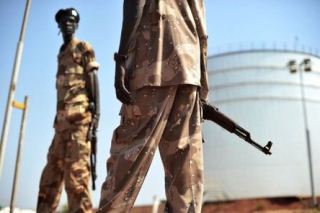South Sudan puts its army on maximum alert in oil row escalation
By Ngor Arol Garang
January 25, 2012 (JUBA) – South Sudan on Wednesday said it has put its troops on maximum alert, amid growing tensions with Khartoum over the ongoing oil wealth sharing dispute and reports of air bombing by Sudan inside its borders.

The bombing which took place on Monday in the Upper Nile state reportedly left one child injured and 14 other people missing. Upper Nile borders Blue Nile state in Sudan, where the Khartoum government is engaged in conflict with rebels.
On Wednesday the spokesperson for the French foreign ministry Bernard Valero condemned the air raid saying it not only endangered civilians living “in dramatic situation” but also United Nations (UN) and International Organisation for Migration (IOM) staff working there.
“This aggression is a violation of international humanitarian law and involves the lives of civilians and humanitarian workers. This is unacceptable,” the French official said.
Valero also said that France is “very concerned” about recent decisions “taken unilaterally” by both Khartoum and Juba which “go against the spirit of friendship and cooperation which they had been able to demonstrate from January to July 2011”.
Valero urged both parties to “demonstrate responsibility” and to reach an agreement at the Intergovernmental Authority on Development special summit, based on the African Union High-level Implementation Panel proposals.
Speaking at a press briefing in Juba International airport upon arrival from Addis Ababa on Wednesday, Majak D’Agoot, South Sudan’s deputy minister of defence said the Government of South Sudan (GoSS) was aware that Khartoum is mobilising support for militia groups operating along the borders with South Sudan.
Agoot said South Sudan’s troops are on maximum alert, to counter any Khartoum-backed aggression.
The South Sudan official said the talks he attended in Ethiopia with Khartoum were fruitless because of the reluctance of the Sudanese delegation to engage “in honest and meaningful discussions”.
Khartoum has been confiscating South Sudanese oil as what it considers payment for arrears in unpaid transit fees. Juba considers the charge of around US$32 per barrel in fees suggested by Khartoum as exorbitant, but it is landlocked and currently has no other pipeline, other than the one under Khartoum’s control, which terminates at Port Sudan.
Juba claims Khartoum has “looted” US$815 billion worth of its oil. Khartoum is demanding around US$1 billion in unpaid fees since July 2011.
As a result of dispute South Sudan has stopped output at more than 300 wells and has reduced production at 600 more.
According to the South’s chief negotiator in talks being held in Addis Ababa, Pagan Amum, output is expected to be reduced from 275,000 to 135,000 barrels per day. He also said US$2.6 billions would be disbursed to Sudan within four years after separation and that US$2.8 billion in South Sudanese arrears be forgiven.
As South Sudan relies on oil revenues for 90 per cent of its economy, the prohibitive costliness and time consuming nature of constructing an alternative pipeline through neighbouring Kenya to the coast at Lamu, the stalemate is unlikely to be tenable for long.
Aleu Ayeny Aleu, a member of the National Assembly from Warrap commended the decision to reduce oil production.
“Nothing much has changed. The standoff on oil have not been resolved”, Agoot told journalists on Wednesday in Juba, but expressed South Sudan’s willingness to negotiate “a fair deal” with Khartoum.
While still at the Addis Ababa summit Agoot told Sudan Tribune that his “profound” knowledge of the Sudanese government made the Sudanese defence minister, Abdel-Rahim Mohammed Hussein reluctant to hold discussions with his delegation.
Agoot served as deputy National Intelligence and Security Service (NISS) in Khartoum during the interim period, before he was appointed as South Sudan’s deputy defence minister after secession on 9 July 2011.
Agoot was accompanied by the general chief of staff of the Sudan People’s Liberation Army, James Hoth Mai.
(ST)
